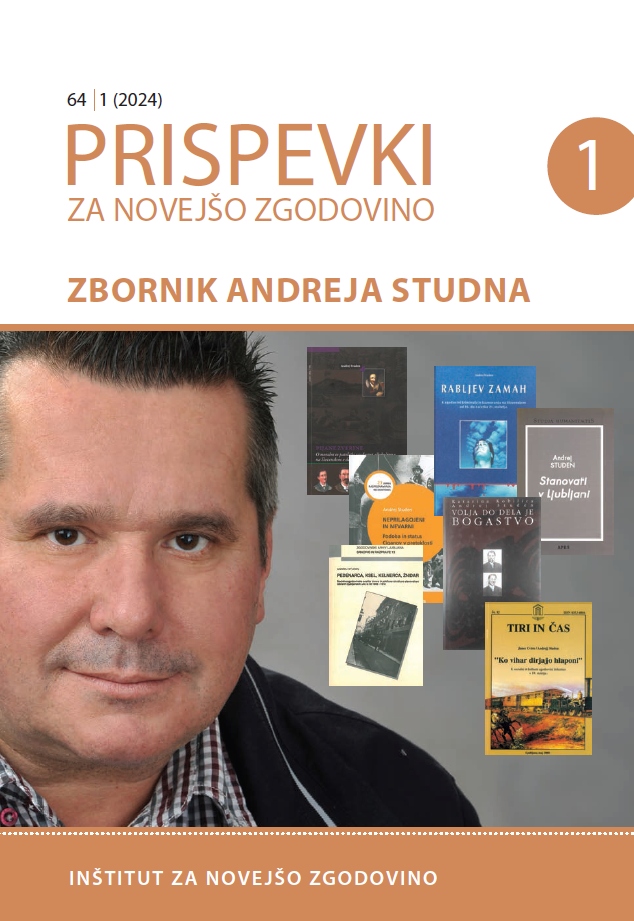The Role of the Sewing Machine in the Social and Economic History of Everyday Life in the 19th and the First Half of the 20th Century
DOI:
https://doi.org/10.51663/pnz.64.1.15Keywords:
sewing machine, seamstress, dressmaking craft, education, housekeeping, Austro-Hungarian Monarchy, Kingdom of SCS/Yugoslavia, Singer CompanyAbstract
The article focuses on the sewing machine’s role in economic and social history. First, it examines the long development and the marketing and advertising techniques that enabled the sewing machine to find a place in people’s everyday lives. The second part of the article explores the Slovenian territory, the development of the education system, and, consequently, the development of the seamstress profession.
References
Barm, Ava in Susan E. Klepp. »If I Didn’t Have My Sewing Machine …«: Women and Sewing Machine Technology. V: Joan M. Jensen in Sue Davidson (ur.). A Needle, a Bobbin, a Strike, 20–59. Philadelphia: Temple press, 2018. Dostopno na: https://www.jstor.org/stable/j.ctv941x68.6. Pridobljeno 21. 9. 2023.
Burman, Barbara (ur.). The Culture of Sewing: Gender, Consumption and Home Dressmaking. Oxford: 1999.
Cerar, Estera. Šivalni stroj – revolucija v izdelavi oblačil. Šolska kronika, 20(44), št. 3 (2011): 446–63.
Coffin, Judith C. Credit, Consumption and Images of Women's Desires: Selling the Sewing Machine in Late Nineteenth Century France. French Historical Studies, 18/3 (1994): 749–83. Dostopno na: https://www.jstor.org/stable/286691. Pridobljeno 28. 9. 2023.
Davies, Robert D. »Peacefully Working to Conquer the World:« The Singer Manufacturing Company in Foreign Markets, 1854–1889. Bsuness History Review, XLIII, št. 3 (1969): 299–325.
Fischer, Jasna. Družba, gospodarstvo, prebivalstvo: družbena in poklicna struktura prebivalstva na slovenskem ozemlju od druge polovice 19. stoletja do razpada habsburške monarhije. Ljubljana: Inštitut za novejšo zgodovino, 2005.
Godley, Andrew C. »Selling the Sewing Machine Around the World: Singer's International Marketing Strategies, 1850–1920.« Enterprise & Society, 7 (2006): 266–314.
Hojan, Tatjana. Ema Arko, Marija Vehar in Alojzija Kristl Novak – učiteljice na oddelku Ženska obrtna šola na Državni obrtni šoli v Ljubljani. Šolska kronika, 20, št. 3 (2011): 464–72. Dostopno na: Digitalna knjižnica Slovenije – dLib.si. https://www.dlib.si/details/URN:NBN:SI:doc-S40PGB6H. Pridobljeno 24. 11. 2023.
Kalc, Aleksej. O vidnosti in nevidnosti ženskega dela. Viri in metodološka vprašanja. V: Nina Vodopivec (ur.). Žensko delo: Delo žensk v zgodovinski perspektivi, 29–37. Ljubljana: Inštitut za novejšo zgodovino, 2015.
Kobe-Arzenšek, Katarina. Ponudba šivalnih strojev v oglasih časopisa Slovenski Narod v drugi polovici 19. stoletja (1868–1900). Tekstilec 29, št. 4 (1986): 132.
Kobe-Arzenšek, Katarina. Ponudba šivalnikov v oglasih časopisa Slovenski Narod v prvih dveh desetletjih 20. stoletja. Tekstilec 32, št. 9 (1989): 301–10.
Kobe-Arzenšek, Katarina. Prispevek k zgodovini šivalne naprave v besedi in sliki (drugo nadaljevanje). Tekstilec 35, št. 11¬–12 (1992): 502–16.
Kobe-Arzenšek, Katarina. Prispevek k zgodovini šivalne naprave v besedi in sliki (prvo nadaljevanje). Tekstilec 34, št. 9 (1991): 338–44.
Lazarević, Žarko. Gospodarska dejavnost žensk in gospodarsko zgodovinopisje. V: Nina Vodopivec (ur.). Žensko delo: Delo žensk v zgodovinski perspektivi, 9–18. Ljubljana: Inštitut za novejšo zgodovino, 2015.
Lazarević, Žarko. Temeljne razvojne poteze v obrti od srede 19. stoletja do druge svetovne vojne. V: Obrt v našem kraju, 16–28. Ljubljana: Zveza prijateljev mladine Slovenije, 1998.
Papastefanaki, Leda. Sewing at Home in Greece, 1870s to 1930s A Global History Perspective. V: Malin Nilson, Indrani Mazumdar in Silke Neunsinger (ur.). Home-Based Work and Home-Based Workers (1800–2021). E-book (PDF): Brill, 2022. Dostopno na: https://www.jstor.org/stable/10.1163/j.ctv29sfvdz.12. Pridobljeno 21. 9. 2023.
Putnam, Tim. The Sewing Machine Comes Home. V: Barbara Burman (ur.) The Culture of Sewing. Gender, Consumption and Home Dressmaking, 269–84. Oxford – New York: Berg, 1999.
Studen, Andrej. Dobra meščanska gospodinja. Ideološki pogledi na žensko delo v dobi meščanstva. V: Nina Vodopivec (ur.). Žensko delo: Delo žensk v zgodovinski perspektivi, 89–102. Ljubljana: Inštitut za novejšo zgodovino, 2015.
Vodopivec, Nina. Tu se ne bo nikoli več šivalo: doživljanja izgube dela in propada tovarne. Ljubljana: Inštitut za novejšo zgodovino, 2021.
Žnidaršič-Žagar, Sabina. Ora et labora – in molči ženska!: pregled demografije dežele Kranjske in pridobitnost žensk v desetletjih 1880–1910. Ljubljana: Založba /*cf., 2000.
Downloads
Published
Issue
Section
License
Copyright (c) 2024 Nataša Henig Miščič

This work is licensed under a Creative Commons Attribution 4.0 International License.
Authors who publish with this journal agree to the following terms:
- Authors retain copyright and grant the journal right of first publication with the work simultaneously licensed under a Creative Commons Attribution License that allows others to share the work with an acknowledgement of the work's authorship and initial publication in this journal.
- Authors are able to enter into separate, additional contractual arrangements for the non-exclusive distribution of the journal's published version of the work (e.g., post it to an institutional repository or publish it in a book), with an acknowledgement of its initial publication in this journal.
- Authors are permitted and encouraged to post their work online (e.g., in institutional repositories or on their website) prior to and during the submission process, as it can lead to productive exchanges, as well as earlier and greater citation of published work (See The Effect of Open Access).


